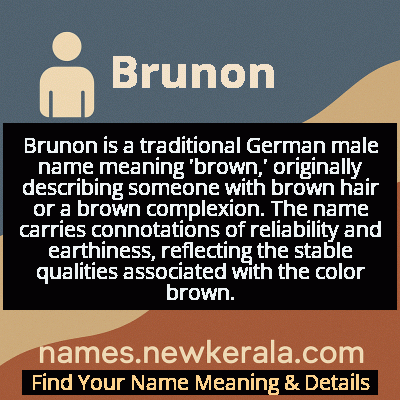Brunon Name Meaning & Details
Origin, Popularity, Numerology Analysis & Name Meaning of Brunon
Discover the origin, meaning, and cultural significance of the name BRUNON. Delve into its historical roots and explore the lasting impact it has had on communities and traditions.
Name
Brunon
Gender
Male
Origin
German
Lucky Number
3
Meaning of the Name - Brunon
Brunon is a traditional German male name meaning 'brown,' originally describing someone with brown hair or a brown complexion. The name carries connotations of reliability and earthiness, reflecting the stable qualities associated with the color brown.
Brunon - Complete Numerology Analysis
Your Numerology Number
Based on Pythagorean Numerology System
Ruling Planet
Jupiter
Positive Nature
Optimistic, inspirational, and creative.
Negative Traits
Scattered, exaggerating.
Lucky Colours
Yellow, gold, purple.
Lucky Days
Thursday.
Lucky Stones
Yellow sapphire.
Harmony Numbers
1, 2, 9.
Best Suited Professions
Arts, writing, communication.
What People Like About You
Creativity, optimism.
Famous People Named Brunon
Brunon of Querfurt
Missionary and Saint
Christian missionary to Prussia, martyred in 1009 and later canonized
Brunon of Cologne
Archbishop
Archbishop of Cologne and Duke of Lotharingia, founded several monasteries
Brunon the Great
Archbishop
Archbishop of Cologne and influential political figure in the Holy Roman Empire
Brunon Zwarico
Military Officer
Polish military officer and resistance fighter during World War II
Name Variations & International Equivalents
Click on blue names to explore their detailed meanings. Gray names with will be available soon.
Cultural & Historical Significance
Throughout German history, the name has been associated with nobility, religious leadership, and intellectual pursuits, reflecting the cultural values of strength, reliability, and spiritual devotion. In Polish and Czech contexts, Brunon became popular through cultural exchange with German-speaking regions, often maintaining its aristocratic and educated connotations while adapting to local linguistic patterns. The name's persistence across centuries demonstrates its enduring appeal as a marker of cultural identity and historical continuity in Central European societies.
Extended Personality Analysis
Individuals named Brunon are typically perceived as grounded, reliable, and practical people. The name's connection to the color brown suggests qualities of stability, earthiness, and dependability—much like the earth itself. Brunons are often seen as people who approach life with a sensible, no-nonsense attitude, preferring practical solutions over theoretical abstractions. They tend to be patient, methodical workers who value tradition and consistency in their personal and professional lives.
At the same time, the historical association with religious figures gives the name an undertone of spiritual depth and moral conviction. Many Brunons are thought to possess strong principles and a sense of duty, often taking on leadership roles where their steady nature can guide others through challenging situations. While they may not be the most flamboyant personalities, their quiet strength and unwavering reliability make them valued friends, family members, and colleagues who provide a stable foundation in relationships and communities.
Modern Usage & Popularity
In contemporary times, Brunon remains a relatively rare name, primarily found in German-speaking countries and among people of German descent worldwide. While it has never reached the popularity of its shortened form 'Bruno,' it maintains a niche appeal among parents seeking traditional Germanic names with historical significance. The name is particularly popular in Poland, where it has been adopted and maintained as a classic choice. Modern usage trends show that Brunon is often chosen by families with strong connections to German heritage or those appreciating medieval history. In recent decades, the name has seen a slight resurgence as part of the broader trend toward reviving traditional names, though it remains far less common than many other Germanic names.
Symbolic & Spiritual Meanings
Symbolically, Brunon represents earthiness, stability, and reliability—qualities associated with the color brown from which it derives. The name evokes images of fertile soil, autumn harvests, and the dependable foundation of the earth itself. In metaphorical terms, Brunon symbolizes someone who provides solid ground for others, much like the earth supports all life. The historical religious associations add layers of spiritual symbolism, representing faith, martyrdom, and moral conviction. The name also carries connotations of autumn and maturity, suggesting wisdom that comes with experience rather than youth. In psychological symbolism, Brunon represents the archetype of the steady guardian or the reliable foundation upon which communities and families are built.

